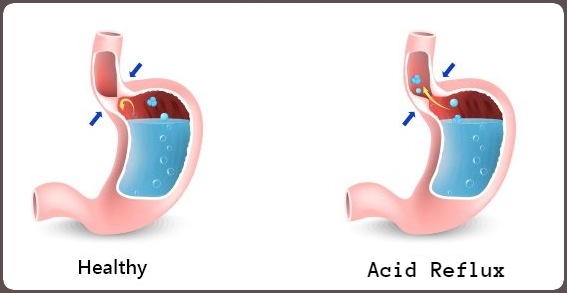Almonds may help reduce acid reflux symptoms because they are high in fibre. Besides, almonds are generally alkaline, meaning they are not acidic.
On the other hand, however, almonds contain a significant amount of fat, which can delay stomach emptying and thus increase the risk of acid reflux in susceptible individuals.
The first two paragraphs indicate that almonds can be a double-edged sword for people with acid reflux.
In this article, we’ll discuss the pros and cons of eating almonds for chronic acid reflux, called GERD.
What is Acid Reflux?
Acid reflux occurs when stomach acid flows back up into the food pipe, the esophagus.
Normally, the lower esophageal sphincter (LES) — a valve-like muscle located at the lower end of the esophagus — doesn’t allow stomach acid to flow back up into the mouth.
However, sometimes LES muscle relaxes when it shouldn’t, or doesn’t fully close. This allows stomach acid to back up into the esophagus, causing reflux symptoms.
The image below illustrates the function of the lower esophageal sphincter (LES).

Heartburn — the burning sensation in the chest — is the most common symptom of acid reflux. Yet, acid reflux and heartburn are often used interchangeably.
It is quite normal to experience heartburn from time to time. However, if you experience heartburn or other acid reflux symptoms persistently, you may have gastroesophageal reflux disease (GERD), according to Mayo Clinic.
Almonds and Heartburn
Almonds are one of the most popular tree nuts consumed throughout the world. They contain many essential nutrients and are therefore associated with various health benefits.
Because they are highly nutritious and known to be beneficial for the human body, it might be tempting to think that almonds can also help with acid reflux, which is one of the most common digestive disorders.
As mentioned at the beginning, almonds’ high fibre content makes them potentially beneficial for GERD patients. Additionally, almonds are alkaline-forming foods, meaning they can help offset strong stomach acid.
However, apart from these assumptions made based on the basic nature of almonds, there is no scientific evidence to confirm that almonds can help relieve or prevent acid reflux symptoms.
At this point, it is important to note that it is difficult for researchers to evaluate the effectiveness of a particular food on GERD because people react differently to food and acid reflux can occur due to several reasons. These factors might be the reason why the effects of almonds on GERD have not been tested in scientific studies.
Above, we also said that eating almonds might trigger heartburn in some individuals because they are high in fat. While that is scientifically accurate that fat ingestion may trigger heartburn, the amount and type of fat entering the stomach is the determinant factor. In small amounts, fat (especially healthy type, known as unsaturated fat) shouldn’t provoke acid reflux symptoms. Besides, everyone has different food triggers and everyone is not triggered to the same degree. More importantly, there is no study showing that almonds can trigger heartburn in GERD patients.
Due to a lack of research pertaining to almonds and acid reflux, it is difficult to conclusively say whether almonds in your diet can help or aggravate acid reflux symptoms.
That said, it appears that eating almonds in small quantities may improve acid reflux symptoms because they have antioxidant properties and high fibre content.
In the rest of the article, we’ll take a closer look at how almond consumption may impact acid reflux symptoms.
How Might Almonds Help With Heartburn?
In a 2018 study, a fibre-enriched diet was found to help reduce acid reflux symptoms and improve esophageal motility in patients with non-erosive GERD.
Almonds are one of the highest sources of fibre among tree nuts. According to the U.S Department of Agriculture; one serving of almonds contains around 3.50 mg of dietary fibre.
Besides, unlike other nuts such as cashews and walnuts, almonds are generally alkaline. According to Johns Hopkins Medicine; alkaline foods can help neutralise strong stomach acid.
Please note that consuming acidic foods or beverages can increase stomach acid and may lead to additional heartburn in GERD patients. According to the American College of Gastroenterology, acidic foods may irritate the damaged lining of the esophagus.
How Might Almonds Trigger or Worsen Heartburn?
Foods high in saturated and trans fats are especially bad for GERD. However, foods that contain mostly healthy types of fat such as avocados and walnuts may also contribute to acid reflux symptoms, as large amounts of any fat can be irritating
Fat stays in the stomach longer than other macronutrients, which delays stomach emptying. Studies showed that delayed gastric (stomach) emptying can cause excess stomach acid production, thereby, increasing the risk of reflux.
In addition to attracting more stomach acid, fatty foods may also trigger a response within the body that relaxes the lower esophageal sphincter (LES), especially in susceptible individuals.
According to a 2019 study, eating fatty foods may result in relaxing the lower esophageal sphincter, increasing the likelihood of acid reflux.
Almonds don’t contain as much fat as walnuts and brazil nuts contain. Still, almonds are considered high in fat.
According to the Harvard School of Public Health, ¼ cup of almonds contains 14 grams of fat. Approximately, 80% of it is monounsaturated, a healthy type of fat.
Eating almonds in high quantities or together with other fatty foods may increase your risk of experiencing heartburn or other acid reflux symptoms.
Conclusion
Scientific studies that examined the effects of foods on acid reflux have produced mixed results. This is mainly because of the fact that people tend to react differently to the same food. This stands true with almonds, although — to our knowledge — no study has specifically examined the effects of almond consumption on GERD.
While almonds may pose a reflux risk due to their high-fat content, they also contain antioxidants and fibre, both of which have been shown to improve reflux symptoms.
Note that, eating almonds as a snack could prevent you from eating unhealthy snacks that are high in saturated or trans fat that could easily worsen your acid reflux symptoms.
How Many Almonds Are Safe For People With Heartburn?
You should determine the appropriate quantity of almonds that you can consume without experiencing heartburn.
If almonds aren’t part of your diet, you can introduce these nutritious nuts to your diet in small amounts, such as 7 to 8 kernels a day. Then, pay attention to your symptoms. Based on your symptoms, you can either increase or lower the number of almonds you eat per day.
It bears repeating; in small amounts, almonds — although high in fat — shouldn’t provoke your GERD symptoms.
Recommendations For GERD Patients
- Maintain a healthy weight.
- Stop smoking and limit alcohol consumption.
- Eat foods thoroughly and chew slowly.
- Avoid eating heavy meals before bed.
- Avoid foods that could worsen the symptoms. According to the Mayo Clinic, alcohol, chocolate, mint, garlic, onion, caffeine, tomatoes and tomato sauce are common food triggers.
- Consider sleeping on your left.
- Prefer exercises that don’t aggravate acid reflux, such as walking or very light jogging.
- Avoid wearing clothes that are too tight around the stomach.
- Always work with your doctor to treat chronic acid reflux. And, also consider working with a registered dietitian who can help you with your acid reflux management diet.




